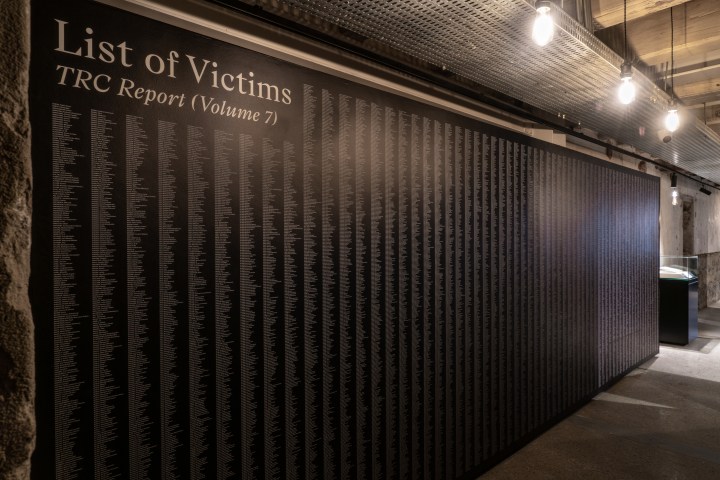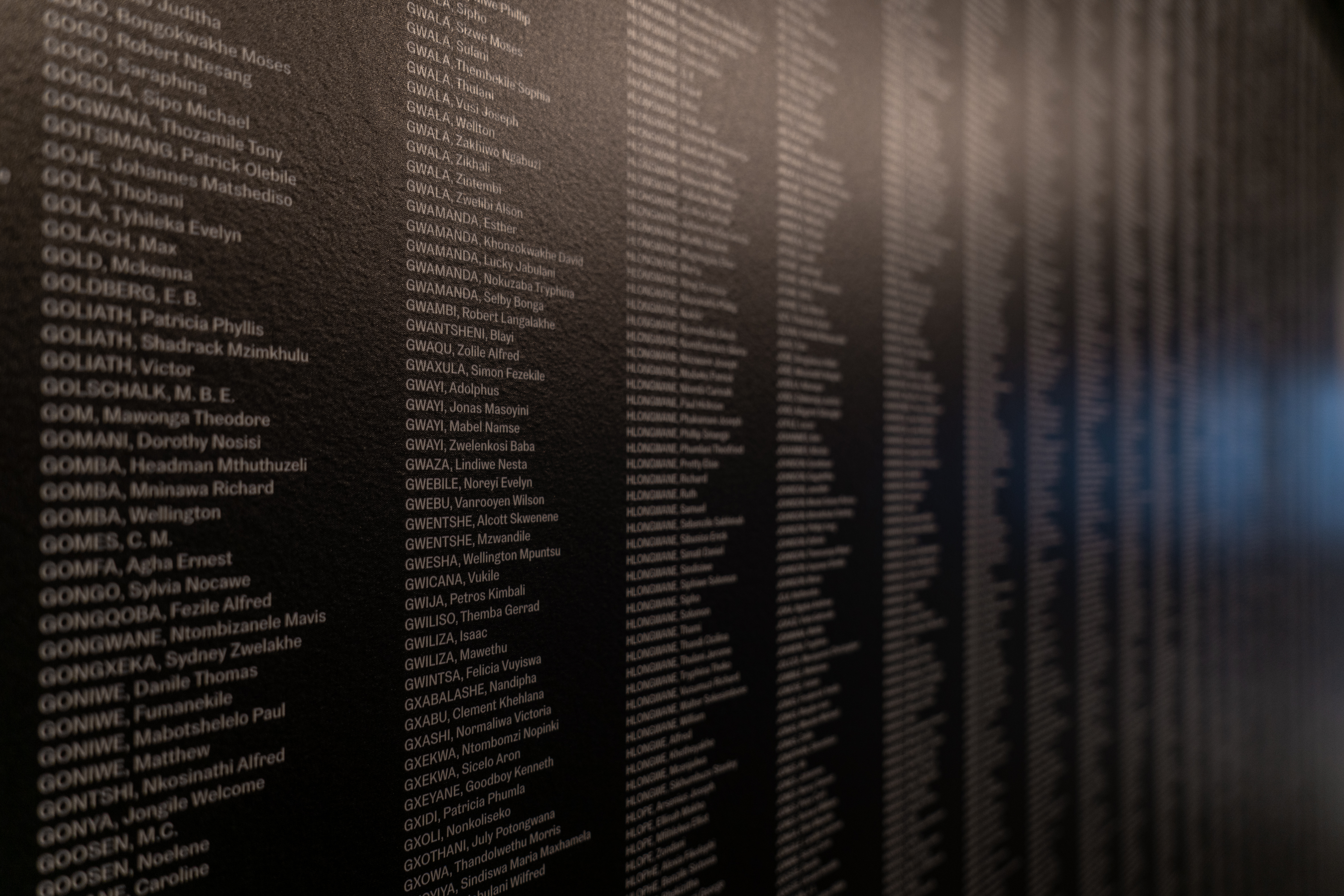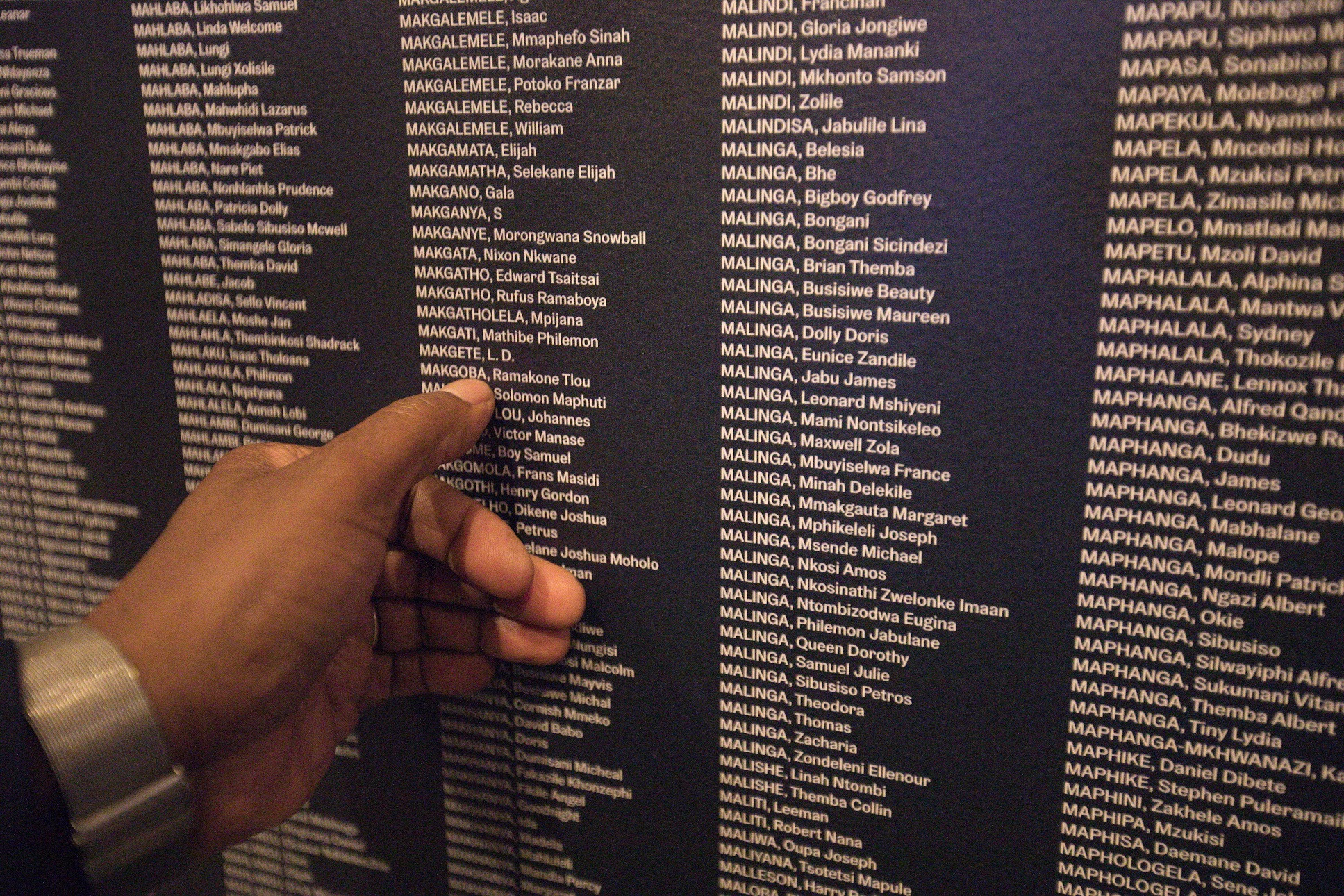TESTAMENT TO MEMORY
The apartheid victims’ wall at the Archbishop Tutu exhibition in Cape Town

A wall inscribed with the names of more than 19,000 known victims of apartheid, as recorded in the seventh volume of the Truth and Reconciliation Commission report, can be found at the new Archbishop Desmond Tutu exhibition at the Old Granary in Cape Town.
The wall serves as a striking tribute to those who suffered for the country’s liberation; it is also a reminder of the failure of the South African government to provide closure to victims through reparations and criminal prosecutions.
Of all the themes represented at the new Archbishop Desmond Tutu exhibition, Truth To Power: Desmond Tutu and the Churches in the Struggle Against Apartheid, at the Old Granary building in Cape Town, the one centred on the Truth and Reconciliation Commission (TRC) and its unfinished business is arguably the most sombre. One wall of the space is inscribed with more than 19,000 names of known apartheid victims, as recorded in the seventh volume of the TRC report.
The wall is accompanied by a video containing clips from the TRC hearings, where people came to share both offences committed and suffering endured under apartheid. It is a stark reminder that behind each name on the wall is an individual story of pain and grief.
The commission received statements from 21,290 people, of whom more than 19,050 were found to be victims of gross violations of human rights, according to the foreword to volume seven of the TRC report.

In accordance with the Promotion of National Unity and Reconciliation Act 34 of 1995, the Truth and Reconciliation Commission could grant an applicant amnesty only if the applicant could show that the offence they committed under apartheid had a political objective, and that they had made full disclosure of the relevant facts related to the event. Image: David Ross
Speaking about her visit to the exhibition, human rights lawyer and former TRC commissioner Yasmin Sooka said: “I think [the wall] is really striking… I was really struck by the powerful symbolism and imagery of it, and it reminded me to some extent of some of the walls that are up in Freedom Park with the names of people who died during different phases of the conflict in South Africa.”
“[T]his is really a powerful testament to memory, and in this way we can honour those who gave up their lives for freedom, who weren’t really members of the armed factions of different liberation movements, but really ordinary civilians who in some way rose up against the state in protest against apartheid and lost their lives in that context… It’s symbolic and very moving.”
The installation of the victims’ wall at the exhibition was the idea of Piyushi Kotecha, the outgoing CEO of the Desmond and Leah Tutu Legacy Foundation. Since no monument previously existed for those victims of apartheid crimes revealed during the TRC process, it seemed fitting that the wall be built at the exhibition as a celebration of the life and work of the Arch, who chaired the TRC, according to Phumi Nhlapo, acting CEO of the Desmond and Leah Tutu Legacy Foundation.
“One of the quotes the Arch used often was that ‘we learn from history that we don’t learn from history’. The wall stands as a reminder of what we have been through as a country. The TRC took more than 20,000 testimonies and about 2,000 of these were heard in public hearings. It was an emotional time for us as a country and the Arch held this space for an entire nation,” said Nhlapo.

The wall of apartheid victims at the Old Granary exhibition, ‘Truth To Power: Desmond Tutu and the Churches in the Struggle Against Apartheid’, has been an emotional experience for all visitors, according to Phumi Nhlapo, acting CEO of the Desmond and Leah Tutu Legacy Foundation. Those who were directly impacted by apartheid, or know people who were, immediately start searching the wall for their own names or those of their loved ones, she said. Image: Shelley Christians / Desmond and Leah Tutu Legacy Foundation
The victims’ wall has been an “emotional experience” for all those who have visited the exhibition, she continued. For the young, it raises consciousness about a traumatic period in South Africa that is not part of their lived history; for those who are older, with haunting memories of the TRC hearings, it is a reminder never to forget.
“Those who were directly impacted or know people who were, immediately start interacting with the wall and looking for their own names or the names of their loved ones. No one walks away from the wall unmoved,” said Nhlapo.
Tragedy and transition
The TRC was intended to uncover apartheid-era human rights violations and promote reconciliation between victims and perpetrators from this period, according to the exhibition’s display on the subject, titled Unfinished Business: Tutu, Truth and Reconciliation. It focused on incidents that occurred between 1960 and 1994, and granting amnesty to those individuals who fully disclosed politically motivated crimes.
In 1995, then president Nelson Mandela appointed 17 TRC commissioners from various backgrounds, including human rights lawyers, clergy, medical professionals and politicians. Hearings began in April 1996.
“I think none of us had a sense of the sheer scale, and the systemic and widespread nature, of the apartheid machinery, which really targeted anybody who dared to raise their voice against the system.”
“I don’t think anything really prepared us for, you know, what we had to work through,” said Sooka. “I mean, I think all of us thought we knew about apartheid. And we knew about what was happening across the country. But I think none of us had a sense of the sheer scale, and the systemic and widespread nature, of the apartheid machinery, which really targeted anybody who dared to raise their voice against the system.”
Sooka worked alongside Tutu on the Human Rights Violations Committee under the commission. She often wonders, she said, if the struggles with the Arch’s health began with the testimonies that were given before the commission.
“[Tutu] is a remarkable figure in terms of leadership, but he also absorbed all of the emotions and all of the pain,” said Sooka. Despite the many different calls for the Arch to make decisions at that time, he always found a way of making everyone feel that they were special, she added.
“I think he absorbed a lot of the pain and the suffering, and even though I think he would have said he was quite inured to it, having known about what the apartheid machinery was about, nevertheless I think it had a massive impact on his health. And I think it did take him a long time to come to terms with the awfulness of what had happened during our past.”
Tutu himself, featuring in the documentary Facing the Truth in 1999, said: “I thought I knew the awfulness of apartheid. But you see, when it ceases to be statistics and it is a real live human being who says this, that, and the other happened, that devastates you.”
The Arch was lauded for the seminal role he played in the TRC process in the eulogy given by President Cyril Ramaphosa at his funeral in January 2022. The country could have taken a path of retribution, said the President, but the project of national reconciliation and recognising injustices of the past set South Africa apart from many societies in transition.
“Alongside President Nelson Mandela, Archbishop Tutu helped steer our nation through this painful period,” said Ramaphosa. “While our beloved Madiba was the father of our democracy, Archbishop Tutu was the spiritual father of our new nation.”
The TRC achieved its political ends of ensuring a peaceful transition to democracy, while also building a foundation for future accountability, said Sooka. However, the state’s subsequent failure to deal with community reparations and criminal accountability, as well as the broader project of nation-building, has undermined the value of the commission’s work.
Unfinished business
The victims’ wall at the exhibition brings to the fore the fact that those who came forward to tell their stories at the commission received no closure, as the TRC reports were shelved by the democratically elected government, said Nhlapo. This was a source of sorrow for the Arch, who believed in the power of restorative justice as the foundation for the work of the commission.
“In many ways, it negates a lot of the work that was done, because remember, constitutional compromise was based on the fact that if you did not apply for amnesty, or if you were refused amnesty, then the law would follow its course. And if one considers as we’re talking about serious international crime, then a nation’s obligations in terms of international law are to prosecute,” said Sooka.
While the amnesty offered by the TRC was a generous opportunity, it was also a suspension of law at a particular moment in time for a particular purpose, she continued. When the commission handed over the names of those who needed to be investigated and potentially prosecuted, and the state failed to follow through with the process, it negated the value of the constitutional compromise.
The TRC referred about 300 cases in which amnesty was refused, or not applied for, to the National Prosecuting Authority (NPA), according to the exhibition display. In 2019, it emerged that the government had discouraged prosecutions, and by 2021 only one prosecution had been completed.
“I appeal to the Government that we meet this solemn obligation and responsibility.”
On 5 February 2019, former TRC commissioners submitted a letter to Ramaphosa, calling on him to appoint a commission of inquiry into the political interference that stopped the investigation and prosecution of almost all of the cases referred to the NPA by the commission.
Nhlapo referenced Tutu’s words in the foreword to the TRC’s final report: “We hope that the Commission’s Report brings a measure of closure to the process. I regret that at the time of writing we owe so much in the way of reparations to those who have been declared victims. The healing of those who came to us does hinge on their receiving more substantial reparations and I would be deeply distressed if our country were to let down those who had the magnanimity and generosity of spirit to reveal their pain in public. I appeal to the Government that we meet this solemn obligation and responsibility.”
The call for government action still stands, 24 years after the completion of the TRC’s work, emphasised Nhlapo. The Desmond and Leah Tutu Legacy Foundation has joined the call by the Foundation for Human Rights for a presidential commission of enquiry into the suppression of the TRC cases.
“Government simply must make right its wrong and implement the TRC’s recommendation,” she said. “While it was an incredible feat for us as a young democracy to establish the TRC, with the world looking to South Africa as an example, we, like the Arch, believe that the work of the TRC remains unfinished.” DM/MC/ML


















 Become an Insider
Become an Insider
Comments - Please login in order to comment.